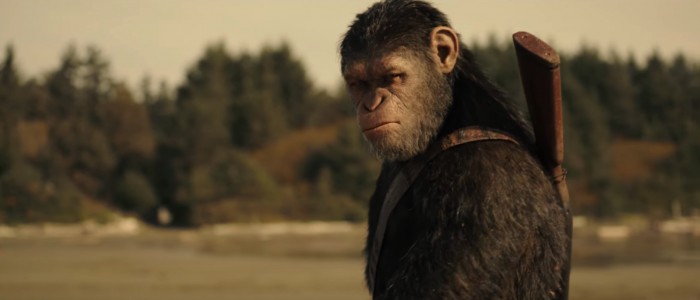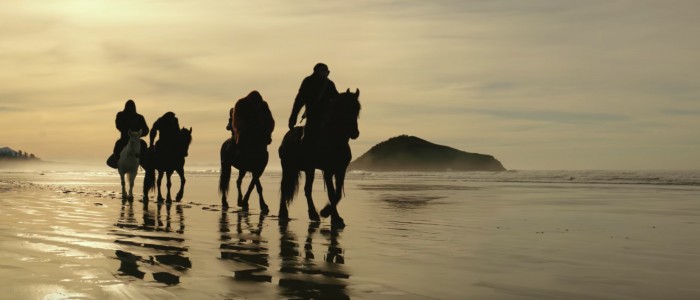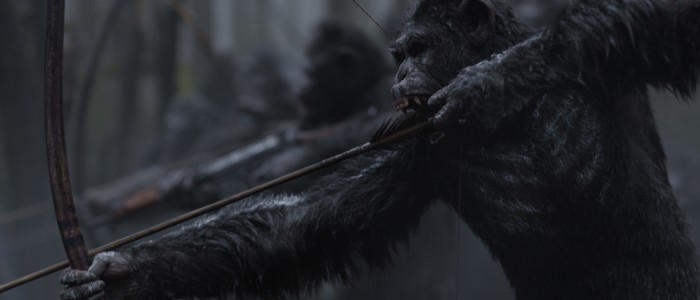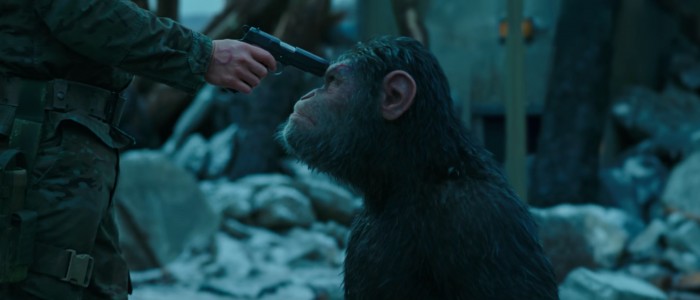Interview: 'War For The Planet Of The Apes' Director Matt Reeves & Producer Dylan Clark On Westerns, Andy Serkis, And Where The Series Could Go Next
Last week brought us our first trailer for War for the Planet of the Apes, which sees Caesar (Andy Serkis) and his apes two years into a bitter war against the humans, led by the Colonel (Woody Harrelson). But I've been lucky enough to see a whole lot more than that, thanks to some incomplete footage screened at New York Comic-Con and at the Fox footage presentation last week. While at Comic-Con, I had the chance to sit down with director Matt Reeves and producer Dylan Clark to talk shooting in 65mm, working with Andy Serkis, the Western influence on the movie, the unexpected humor of it, and where the franchise might be headed next.
One thing I noticed when I was watching the footage is that it ends with the Premium Large Format logo. So did you shoot it in IMAX?Clark: 65mm...Reeves: We shot it in Arriflex 65 which is a new format. It's gorgeous.Clark: What was great about this movie, we had a little bit more time to prep. We had no time to prep for the last movie for Matt. Matt came in very quickly and basically shot what I like to refer to as a great first draft.Reeves: It was a giant improv movie.Clark: It was. It was terrifying, and thank God we had Andy Serkis and some other quality actors that were very nimble and could get through that quickly. But we actually had a proper script and a proper story as well as a production plan that allowed for us to be very ambitious. But one of the things Matt really wanted was to have more flexibility. 3D cameras were, it was so interesting to shoot in native, but marrying 3D camera and motion capture technology was quite challenging out in the extreme world of Canada.Reeves: Well, those cameras were super heavy. So you had to shoot everything off of a crane. I was so limited in the kinds of shots I could get, and we wanted this one to be a grand war movie, and a friend of mine had told me that he'd seen the new Arri 65, and so I went to Dylan and I was like going, "We could make this like a big epic, like, you know, like a David Lean movie." And he got really excited.Clark: And we went and saw a test and we were like, oh, this is really good.Reeves: Oh my God, the imagery is incredible. They use these adapted Hasselblad lenses and they're like 6K images, and it's just astonishing. It's really beautiful.Clark: So, again, it was exciting to give the team more advancement and prep time to be able to go and be as ambitious as possible. And that's why I said, Matt wrote the biggest story, he put Caesar in the biggest arc. What Andy has to do in this movie is try and go on the darkest path he's been on, but also experience some of the lightest moments. We have some great comedy, and just some truly magical things that happen along the way. But the filmmaking is giant. And so the experiences, it's really rich. We were excited to show you guys last night.Yup, we were excited to see it.Clark: Cool. You mentioned the comedy and that's one thing I wanted to ask you about. Because yesterday you said it actually has more humor than the last two movies...Clark: Well, comedy's probably not the right word.Reeves: No, I don't think — I think it absolutely is.Clark: It's funny.Reeves: But in the way that... It's funny, because one of the things that... We can't give it away... The funny thing is, there's so much I cannot wait for you to see.Clark: Lot of surprises in this movie, yeah.Reeves: But you can't see it yet. The great thing was, we showed that six-minute, seven-minute clip, and we showed it because we knew that that was just — first of all, we wanted to showcase Andy and show like, hey look, there he is here and then suddenly you're going to see him as an ape, and do that whole process. But it was also a really intimate scene, and we wanted to show that the movie, though it's a grand war movie, still has all of these, the thing that makes these movies so special, which is the intimate relationships with the characters. But it is so the tip of the iceberg. There's so much stuff in this movie that you are not seeing yet. And it is truly comedy. But not, as Dylan is saying, not in a broad way, but in a really, like, a character way.
You mentioned the comedy and that's one thing I wanted to ask you about. Because yesterday you said it actually has more humor than the last two movies...Clark: Well, comedy's probably not the right word.Reeves: No, I don't think — I think it absolutely is.Clark: It's funny.Reeves: But in the way that... It's funny, because one of the things that... We can't give it away... The funny thing is, there's so much I cannot wait for you to see.Clark: Lot of surprises in this movie, yeah.Reeves: But you can't see it yet. The great thing was, we showed that six-minute, seven-minute clip, and we showed it because we knew that that was just — first of all, we wanted to showcase Andy and show like, hey look, there he is here and then suddenly you're going to see him as an ape, and do that whole process. But it was also a really intimate scene, and we wanted to show that the movie, though it's a grand war movie, still has all of these, the thing that makes these movies so special, which is the intimate relationships with the characters. But it is so the tip of the iceberg. There's so much stuff in this movie that you are not seeing yet. And it is truly comedy. But not, as Dylan is saying, not in a broad way, but in a really, like, a character way.
We watched, you know, when Mark and I were watching movies and were getting inspired, we watched Empire Strikes Back again and we were looking at like the way that movie had such spirit in it, and at the same time it was such a dark movie. I think that the way in which this story goes forward in this mythic way, Caesar is so wounded by what happens to his apes that he becomes almost like Clint Eastwood. He becomes a badass, and he loses this sense of empathy. But you see when he sees that girl, that there's somebody who's always going to be tugging at his empathy. And he goes on this journey with this posse, that's like a Western, and as he accumulates more, they become the most unlikely group, and that's where the humor comes from.
Clark: And last night, it was very gratifying. Because you don't know, and it's edited in a certain way where, it cuts at a certain moment, but what you saw was a look from Caesar — Andy — to Maurice and girl that people saw as funny. And when it gets rendered, when you see Karin [Konoval] just do that, it's quite funny. Because Caesar has a plan and he's on a mission.Reeves: He's gonna kill somebody!Clark: And his plan is not to bring along a child. And that plays as, it's humorous.Reeves: And that continues with more characters who we can't reveal.Clark: And we won't reveal. Today. Yet. All right, all right... sounds intriguing. So you were talking about the Western influence. I know in the past you've talked about how you saw this as sort of the, you know, he becomes the ape Moses.Reeves: Yeah.So when did you start thinking of it as kind of a Western? When did you start bringing that influence in?Reeves: The weird thing is, I think we see it as all of those things. The whole idea of Caesar's arc is so grand. You know, he starts as this kind of discarded little being who is essentially supposed to have been wiped out. And someone shows him kindness, and it's a human. He's raised as a human, but he's not human. And then he's thrown in with apes, but he's not quite ape because he was raised by a human. As Andy always so beautifully put it, he said he was sort of like part of both communities but an outsider to both communities. That, in the idea of Dawn, was this way in which he was a bridge to both. And he becomes this leader in this next one.
All right, all right... sounds intriguing. So you were talking about the Western influence. I know in the past you've talked about how you saw this as sort of the, you know, he becomes the ape Moses.Reeves: Yeah.So when did you start thinking of it as kind of a Western? When did you start bringing that influence in?Reeves: The weird thing is, I think we see it as all of those things. The whole idea of Caesar's arc is so grand. You know, he starts as this kind of discarded little being who is essentially supposed to have been wiped out. And someone shows him kindness, and it's a human. He's raised as a human, but he's not human. And then he's thrown in with apes, but he's not quite ape because he was raised by a human. As Andy always so beautifully put it, he said he was sort of like part of both communities but an outsider to both communities. That, in the idea of Dawn, was this way in which he was a bridge to both. And he becomes this leader in this next one.
And then in War, we wanted to push him to this place where he would be pushed to extremes. And we would go deeper into his nature. And as a result, he'd be tested in a way that he would either fail or not fail, and it's what he does in this movie that in our minds, makes him the seminal figure in ape history. If somebody was tested in this way, if somebody was this central to the creation of the ape world in the human story, that person would be like a god. So that's how the whole idea of trying to create him as sort of a Biblical epic story.
But because he gets so wounded, we also kept thinking, 'God, you know what, Andy could be kind of Clint Eastwood in a certain way. I mean, Andy is always quintessentially Andy, but that kind of badass thing sort of makes sense in this. And so it has all these Western influences. And actually, we did a lot of Western kind of stuff also in Dawn, too, you know, 'cause it's apes on horses. So those references have always been part of it. But the cool thing about movies is that they embrace all these aspects of cinema. We watched Kurosawa stuff. We watched Empire. We watched all that stuff.
Clark: David Lean.Reeves: Yeah, we watched Bridge on the River Kwai, we watched Lawrence of Arabia. The cool thing about it for me, the Apes movies, is that in a way, they're classicist. Right? They're total classical movies. The idea of doing myth, it's like a classical form, right? But you're taking new technology to do that, in a way that's incredibly exciting because you're seeing photo-real apes in those roles. And that idea is strange. It's taking something totally new and putting it with something that is totally classical. And that collision makes something really unique. And that's kind of how we feel about it.Clark: And just for the record, I see Andy Serkis as a badass Clint Eastwood character.[All laugh]Reeves: [Joking] Well, let's be honest. That's where we were inspired.Clark: I see him that way, so...Reeves: No, let me say this: There was something on the last movie where we were doing a mo-cap pickup, and Andy was doing some work on another movie and he had his beard here but he also had this kind of ponytail. And he came in and I was like, 'Oh my God, he's Toshiro Mifune.' Like, so badass.Clark: Badass samurai.Reeves: Like God, that's — we've gotta draw that out.Clark: So we're developing our whole Andy Serkis' acting movie in a different way. But Caesar is that empathetic hero. The suspense that's created about the journey Matt just described is, will he become the Caesar we know and love? Or is he going to follow this path that he started to see and experience through Koba?Reeves: He has to pass the test that Koba didn't pass, you know? And will he? That's the journey of the movie.Clark: And that's the suspense, that's the journey. Okay, well, is War for the Planet of the Apes designed to be sort of the end to a trilogy, or is it built to kind of lead into the next chapter? And going off of that, since we all know this is headed toward Planet of the Apes territory, do you ever feel constrained by the obligation to move the story in that direction, or do you ever wish the audience knew less about where this is going to go?Reeves: No, that's the best part!Clark: Yeah, it gives us the most flexibility in that we know where it ends. You know, Matt says this better than anybody. I'm going to turn it over to you.Reeves: The thing to me that's so exciting is, the original series, Planet of the Apes, when you see the first film, which is a great movie, it's like an amazing, mind-bending, Twilight Zone, right? That ending is a reveal, which is that they are on this planet and all along they've been back on Earth. And it's really about our failures. How we fail, the arms race, how we destroyed each other, and how the apes had evolved. Because we know that that's the ending, that it becomes Planet of the Apes, the cool thing about what was started in Rise is, that it's no longer about what happens. It's about how it happens. And stories about how are always about character and psychology.
Okay, well, is War for the Planet of the Apes designed to be sort of the end to a trilogy, or is it built to kind of lead into the next chapter? And going off of that, since we all know this is headed toward Planet of the Apes territory, do you ever feel constrained by the obligation to move the story in that direction, or do you ever wish the audience knew less about where this is going to go?Reeves: No, that's the best part!Clark: Yeah, it gives us the most flexibility in that we know where it ends. You know, Matt says this better than anybody. I'm going to turn it over to you.Reeves: The thing to me that's so exciting is, the original series, Planet of the Apes, when you see the first film, which is a great movie, it's like an amazing, mind-bending, Twilight Zone, right? That ending is a reveal, which is that they are on this planet and all along they've been back on Earth. And it's really about our failures. How we fail, the arms race, how we destroyed each other, and how the apes had evolved. Because we know that that's the ending, that it becomes Planet of the Apes, the cool thing about what was started in Rise is, that it's no longer about what happens. It's about how it happens. And stories about how are always about character and psychology.
And so in our minds, the idea that's the end of the story gives us the chance to tell an epic saga that leads from where Caesar began in Rise to that world. It's not about getting there and then redoing that story. We think it's like a great Russian novel or something, and it's all about following Caesar on that journey and the other apes as it builds along that way.
And you know the ending, but what you do know is also that the world is not that world. So how did it change? Caesar's apes are not like the apes in the Planet of the Apes, right? They're very brutal to the humans. That's not what's going on, so how did that happen? And you know that Cesar had such integrity, and that he has this sort of sense of right and wrong, of his morality, yet you watch that be challenged. He ends up having to kill one of his own. All of those things give us a chance to explore human nature and do it in a way that is really fun. 'Cause these are all, frankly, totally new stories. We're not doing any stories that were done.
Clark: And we never thought, do a trilogy and then end with the '68. It was always about, again, watching Caesar go through this thing, which was the trilogy of how Andy, Caesar, becomes the seminal figure in ape history.I know it's premature, but then does that mean you've thought a little bit about where you might go next?Clark: I think we always are very sober and mindful about making sure that this story works, again, through our friend. We happen to be looking at Andy Serkis as we talk, which is very fun. Through our friend Andy Serkis.Reeves: This is Andy Serkis!Clark: This is Andy Serkis right here! He actually is amazing. He's really that badass.I know, I heard he's like an ape Clint Eastwood.Reeves: We have actually thought about where it would go. That's actually true. But our concern is about making sure that we fulfill this one. The crazy thing about these movies is that in a lot of movies, you know, post is the challenging part. But in this movie, you can continue to write. The great thing about mo-cap is, and Andy and I were just talking about this the other day, we're sort of discovering and exploring the intricacies of articulation. We were looking at certain stuff, and Caesar speaks more than in the last film. And when he does, we were making conscious choices to let him speak more easily, and we looked at it and there's some places where it breaks, where suddenly it's like a, 'Yeah, how you doin'?' And we're like, that doesn't quite work. And so, we can explore all of that and so we won't be done with this movie literally until just before you see it.Okay.Reeves: But we absolutely have ideas about where it goes.Clark: And it's always through character. So we've come to really love Maurice, and we've come to love Rocket.How can you not?Clark: Exactly.Reeves: Oh my God. Wasn't that cool, to see her last night?Clark: So there's lots of different opportunities to explore. So we know that there is mileage left in the characters and because these are character-driven stories, we hope to have more opportunity to tell them. All right. So, one thing we didn't the footage last night was, there was no real mention of the virus. But we know from past movies that the humans are battling the disease as well as the apes. So has that kind of petered out, or is it still spreading?Reeves: Well, in the last movie, the idea in Dawn was that the virus had spread and wiped out basically 98% of humanity, right? Such a small number of humans who are left. Everyone got it, though. So the ones who are left, the humans who are left, they were immune because they're carrying the virus. They're all carriers. But none of the suffered the same effects that destroyed the rest of the world. So they actually do have the virus, but they're immune to its effects. So it's no longer an ongoing thing where they're worried about getting the virus, they all are just carriers but immune.Does that come into play in this movie at all, or is that part of the story just resolved now because everyone's immune?Reeves: I mean, because the virus was a seminal thing in the story, it always comes to play. There's important aspects that that informs in this story, yeah. So in that way, yeah. You know that that's what happened to the world. What?No, I was just — that's very cryptic.Clark: She was leaning in.Reeves: Cryptic! Why do you ask? What are you after? What's going on?Clark: What do you know? What do you know? Who sent you? Who sent you?Reeves: What are you trying to pull? What's going on here?Clark: There are a lot of surprises along the way in this story that are always best left to experience in the present. But as Matt said, we really do try to, the things we've introduced through Rise and carried through Dawn, we are careful to also develop...Reeves: Yeah, to be consistent with.Clark: We want to be consistent.Reeves: It's all part of the universe.Clark: It's part of the canon, yeah.
All right. So, one thing we didn't the footage last night was, there was no real mention of the virus. But we know from past movies that the humans are battling the disease as well as the apes. So has that kind of petered out, or is it still spreading?Reeves: Well, in the last movie, the idea in Dawn was that the virus had spread and wiped out basically 98% of humanity, right? Such a small number of humans who are left. Everyone got it, though. So the ones who are left, the humans who are left, they were immune because they're carrying the virus. They're all carriers. But none of the suffered the same effects that destroyed the rest of the world. So they actually do have the virus, but they're immune to its effects. So it's no longer an ongoing thing where they're worried about getting the virus, they all are just carriers but immune.Does that come into play in this movie at all, or is that part of the story just resolved now because everyone's immune?Reeves: I mean, because the virus was a seminal thing in the story, it always comes to play. There's important aspects that that informs in this story, yeah. So in that way, yeah. You know that that's what happened to the world. What?No, I was just — that's very cryptic.Clark: She was leaning in.Reeves: Cryptic! Why do you ask? What are you after? What's going on?Clark: What do you know? What do you know? Who sent you? Who sent you?Reeves: What are you trying to pull? What's going on here?Clark: There are a lot of surprises along the way in this story that are always best left to experience in the present. But as Matt said, we really do try to, the things we've introduced through Rise and carried through Dawn, we are careful to also develop...Reeves: Yeah, to be consistent with.Clark: We want to be consistent.Reeves: It's all part of the universe.Clark: It's part of the canon, yeah.
***
War for the Planet of the Apes is in theaters July 14, 2017.
